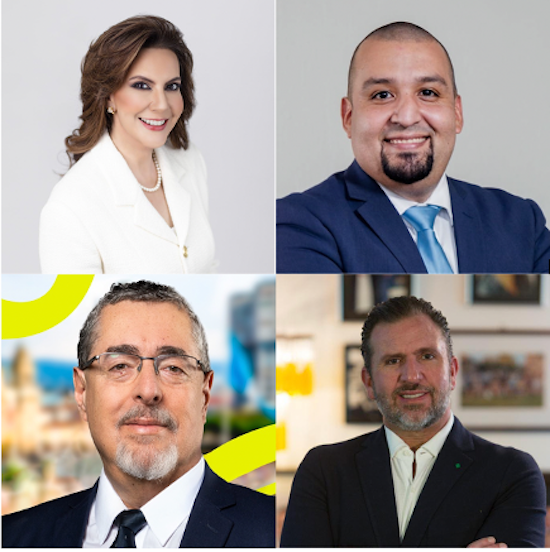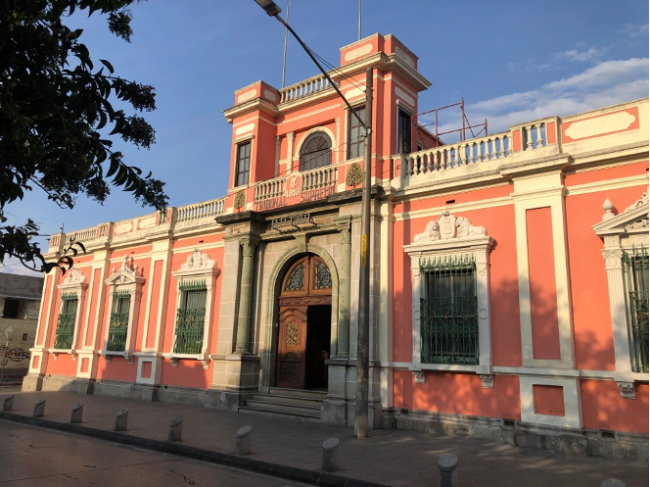
Ríos. Foppa. Arzú. Arévalo. The names read like the pages of a Guatemalan history book, but they come from today’s headlines. Zury Ríos. Juan Francisco Solórzano Foppa. Roberto Arzú. Bernardo Arévalo. They are the children and grandchildren of some of the most illustrious—and notorious—figures from Guatemala’s 20th century, and they have thrown their hats in for the country’s upcoming elections in June.
Running on both the left and the right, these candidates represent dramatically different political agendas and potential futures for Guatemala. Regardless of their political affiliations, the participation of so many legacy candidates in this year’s elections represents not only the continued dominance of traditional political elites, but also the ongoing erosion of democratic norms and the rule of law in Guatemala.
Zury Ríos is the daughter of Efraín Ríos Montt, dictator from 1982-1983 and architect of genocide against Guatemala’s Maya majority. Juan Francisco Solórzano Foppa is the grandson of Alaíde Foppa, a feminist poet and public intellectual who was disappeared by the Guatemalan state in 1980. Roberto Arzú is the son of Álvaro Arzú, president from 1996-2000, who signed the final peace accords bringing an end to Guatemala’s 36-year civil war after a decade of negotiations between the military and the leftist guerrilla coalition. Bernardo Arévalo is the son of Juan José Arévalo, the first democratically elected president of Guatemala who served from 1945 to 1951.
The Candidates
Ríos and Arévalo are vying for the presidency, which will most likely go to a runoff vote in August.
When the campaign season kicked off on March 28, Arévalo launched his campaign with a 20 second spot centering his family legacy. “I am Bernardo Arévalo. I was born during the exile of my parents Juan José Arévalo and Margarita de León. From my parents I inherited love for Guatemala and the strength to fight tirelessly.” Despite his famous surname Arévalo continues to poll well behind other candidates, collecting between 1.5 and 3 percent of respondents’ support.
While Arévalo and his coalition have emphasized his heritage, Zury Ríos has declined to actively spotlight her father in her campaign, despite a political stance that staunchly defends his bloody past. Ríos, who is a member of the populist right wing Valor Party, continues her father’s ultra-conservative political legacy, opposing abortion and advocating in support of the death penalty. Nonetheless, Efraín Ríos Montt has remained an active topic of discussion, especially as the country commemorated the 10-year anniversary of his historic conviction for genocide in May (later overturned by the Constitutional Court under a technicality).
The Guatemalan Constitution bans individuals and their families who seized power through a coup from running for the presidency, the basis upon which Ríos was excluded from running in 2019. The Supreme Electoral Tribunal (TSE) reversed its stance this year allowing her candidacy to go forward, reflecting a deterioration of the rule of law.
While Ríos had been leading in the polls, she recently began to trail behind Carlos Pineda, a businessman and TikToker with almost a million followers who as of early May had become the leading candidate. Pineda has been criticized for his attacks on the press as well as his ties to narcotraffickers. In a disturbing—but not surprising—move, however, the TSE released a preliminary decision on May 20 barring Pineda from the election. He is now the third major presidential candidate excluded from the race, clearing the way for Ríos to advance to the August runoff. Ríos did not respond to requests for comment on this article
Polls show the presidential race—with more than a dozen candidates—has remained unstable as candidates are disqualified and rumors swirl on social media. Edmond Mulet, of the humanist party Cabal, and Sandra Torres, of the social-Christian National Unity of Hope (UNE), currently lead the field alongside Zury Ríos, all hovering around 20 percent of popular support in the polls.
Edmond Mulet, a United Nations diplomat who came in third in the 2019 elections, is accused of running child trafficking rings in the 1980s. Torres, former spouse of President Álvaro Colom (2008-2012), finished second in 2019 and has been unable to shake troubling accusations of ties to narcotraffickers and organized crime. With candidates like these, it is unsurprising that almost a quarter of voters aged 30 to 44 have signaled their intention to vote null in the upcoming elections.
Candidates Sidelined
Roberto Arzú, a right-wing presidential candidate, was disqualified from the race: the TSE annulled his candidacy for campaigning ahead of the official campaign period, and despite appeal efforts the decision was upheld by the Constitutional Court on May 25. Arzú claims his candidacy was revoked as backlash for signaling alleged corruption by the current administration of Alejandro Giammattei.

Indigenous human rights defender Thelma Cabrera and her running mate Jordán Rodas, of the Movement for the Liberation of the People (MLP), were also excluded from the ballot, attracting denunciations from Washington as well as a fact finding mission by human rights watchdog Amnesty International and the Washington Office on Latin America. The TSE claimed that Rodas, a former human rights attorney who served as Ombudsman from 2019 to 2022, was being investigated for an unspecified criminal complaint against him. Cabrera and Rodas continue to contest the TSE’s ruling, and the MLP is calling on its supporters to vote null in the presidential contest to protest their exclusion.
Foppa, for his part, was gaining momentum as a coalition candidate for mayor of Guatemala City and polling in second place behind incumbent Ricardo Quiñonez until the Supreme Electoral Tribunal (TSE) revoked his inscription. He was arrested on April 20 for alleged obstruction of justice for his role as defense lawyer for journalist José Rubén Zamora. Foppa’s arrest is part of a much larger wave of criminalization of anti-corruption investigators, politicians, and activists.
The frontrunner in the Guatemala City mayoral race, Quiñonez, is part of the conservative political coalition Valor-Unionista, represented in the presidential race by Zury Ríos and in the congressional race by Álvaro Arzú, son of the late former president with the same name and brother of the disqualified presidential candidate Roberto Arzú. Quiñonez has served as mayor of Guatemala City since 2018, succeeding Álvaro Arzú the father, who died in office after serving as mayor for nearly15 years.
While Quiñonez has overseen improvements to the city's infrastructure, these projects have been plagued by corruption and targeted wealthy areas of the city, leaving other zones woefully neglected. The progressive Semilla-URNG-Winaq coalition put forward another mayoral candidate, the architect and urban planner Ninotchka Matute Rodríguez, but her candidacy has failed to garner the support held by Foppa.
Similar dynamics unfolded in Guatemala’s last election cycle in 2019 when Thelma Aldana, former attorney general and the leading opposition candidate from the center-left party Movimiento Semilla, was also barred from running. Since then, Aldana has been joined in exile by a majority of Guatemala’s remaining independent judiciary, many of whom have congregated in Washington in an odd reversal of 20th century international relations. Sadly, the exclusion of leading candidates has become a common occurrence in recent elections and has only intensified this year.

“El fraude ya está hecho”
Much like the recent shuttering of ElPeriodico and the wave of electoral exclusions, the prominence of historic political families in the upcoming election is a sign of Guatemala’s increasing authoritarianism. At a recent event hosted by the Foro de Mujeres (Women’s Forum) on women in politics, the congressional candidate Silvia Solórzano Foppa, daughter of Alaíde Foppa and mother of Juan Francisco Solórzano Foppa, explained that although she has always been a “political animal,” she felt compelled to run for elected office based on her assessment of Guatemala’s current political situation as “disastrous.” While some candidates on the Left, such as Silvia Solórzano Foppa, seem to have been drawn to the elections out of genuine concern for the country’s struggling democracy, the participation of so many notorious surnames is in itself an obstacle to the strengthening of democracy in Guatemala.
In recent years, Indigenous candidates have made some inroads into the Guatemalan political system, most notably excluded Maya Mam presidential candidate Thelma Cabrera. Cabrera and the MLP represent the potential for real change in Guatemala, and Cabrera recently attributed her exclusion to elites’ fear of disruption of the status quo. The dominance of traditional ladino families ensures the continuation of established racial hierarchies within the political system and the sustained political and economic exclusion of Guatemala’s Indigenous majority.
“The elections appear fraudulent,” José Tení, a taxi driver in Guatemala City, told me, “because they don’t allow all the ideological currents to participate.” His preferred candidates in 2019 and this year, Thelma Aldana and Carlos Pineda, respectively, were both excluded from running; he is undecided about who he will vote for on June 25. Like many Guatemalans, Tení is worried about government corruption, especially ties to narcotraffickers. Although he plans to vote, he understands that many voters, especially youth, are “disillusioned with politics.”
The Arzú, Río, Foppa, and Arévalo families have had an outsized role in shaping Guatemala’s past. After June 25, we will know what role they will continue to play in shaping Guatemala’s future. While much remains to be seem, many Guatemalans claim that "el fraude ya está hecho," or the fraud is already complete. Given the harrowing political landscape, it is hard to see how the elections will be free or fair.
Emily Taylor is a PhD candidate in Latin American History at UNC Chapel Hill. She is currently based in Guatemala City, Guatemala on a Fulbright Hays DDRA Fellowship.

